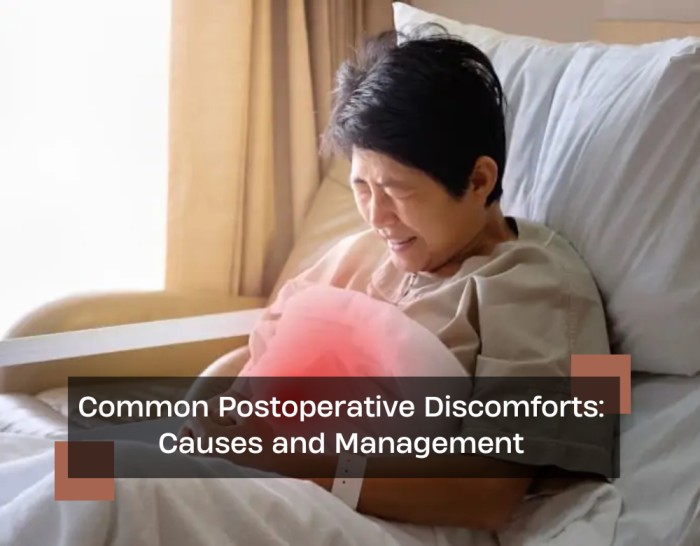
Going through any surgical procedure can be a challenging experience, and aims to improve health and well-being. If you are undergoing any surgery, it is natural to have concerns about what happens afterward. During the recovery process, it is common to experience postoperative discomfort. It is important to differentiate between expected discomfort and signs of complications. Understanding what to expect post-surgery, can help you go through this phase with more ease. In this blog post, we’ll discuss some common postoperative discomforts and how to manage them effectively.
What is Postoperative Discomfort?

Dr. Anubhav Sangwan
According to the leading general surgery doctor in Gurgaon at Miracles Apollo Cradle/Spectra, Postoperative discomfort refers to the symptoms of physical exertion and sensations that patients may experience post-surgery. These discomforts can vary depending on the type of surgical procedure, individual health factors, and the response of the body to the trauma of surgery. If you’re unsure about any postoperative symptoms, it is important to online consult with your surgeon with Dr. Anubhav Sangwan.
What are the Common Postoperative Discomforts?
- Pain: This is one of the most common postoperative discomforts, ranging from mild to severe. It may be localized around the surgical site or radiate to other areas. Your surgeon may use different pain management strategies, including medications and non-pharmacological approaches like ice packs or positioning for comfort.
- Swelling: Swelling (edema) is another common but natural response to surgery and tissue trauma. It generally increases within the first few days after surgery and gradually decreases over time. Elevating the affected area, applying cold compresses, and gentle movement can help reduce swelling and promote circulation.
- Fatigue: Feeling tired after surgery is normal and can last for several weeks as the body focuses its energy on healing. Proper rest, adequate nutrition, and staying hydrated can help in recovery and overcome fatigue.
- Bruising: Bruising (discoloration) of the skin around the surgical site is common after surgery, especially at the site of incisions or tissue manipulation.
- Nausea and Vomiting: Some patients may experience nausea and vomiting after surgical procedures, due to anesthesia, pain medications, or changes in diet. It is important to eat small and light meals, stay hydrated, and take prescribed anti-nausea medications to help manage these symptoms.
- Constipation: Surgery, pain relievers, dietary modifications, and changes in mobility can cause constipation. Maintaining hydration, eating fiber-rich foods, and using stool softeners or laxatives as recommended by your surgeon to relieve constipation and its associated symptoms.
- Difficulty Sleeping: Discomfort, pain, and changes in routine can disturb your sleep patterns after surgery. Setting a relaxing bedtime routine, maintaining a comfortable sleep environment, and taking sleep medications can help promote better sleep quality during recovery.
- Muscle Stiffness and Soreness: Limited mobility and inactivity following surgery can cause muscle stiffness and soreness, especially around the surgical site or surrounding muscle groups.
- Sore Throat: Anesthesia medications and breathing tubes are used during surgery. You may experience dryness and irritation of the mouth and sore throat after anesthesia, leading to discomfort and pain in the throat, and difficulty swallowing.
- Emotional Distress: Surgery and the recovery process can be physically and emotionally challenging, leading to feelings of anxiety, stress, or sadness. Emotional support during this period may be beneficial in managing these feelings and promoting overall well-being during recovery.
- Stomach Cramps: Post-surgery stomach cramps may be uncomfortable but typically resolve as the body adjusts to postoperative changes. They can occur due to several factors such as anesthesia, changes in diet, medication side effects, or gastrointestinal issues. However, if severe or persistent, it’s important to consult with your surgeon provider for proper evaluation and management.
Why Postoperative Discomfort Occurs?
Postoperative discomfort occurs due to several factors related to the surgical procedure and the body’s response to it. Here are some key reasons why postoperative discomfort may occur:
- Tissue Trauma: Surgery involves making incisions and manipulating tissues, which can lead to trauma and irritation of surrounding structures. This trauma initiates the inflammatory response of the body, causing pain, swelling, and tenderness at the surgical site.
- Anesthesia Effects: Anesthesia medications are administered during surgery to induce unconsciousness, relax muscles, and make the procedure painless. Although, these medications can have lingering side effects, such as nausea, dizziness, and fatigue, which can lead to postoperative discomfort.
- Pain Medications: To manage the pain and discomfort during the recovery period, your surgeon may recommend pain medication. However, these medications can cause side effects such as drowsiness, constipation, and nausea.
- Changes in Mobility and Physical Activity: Following surgery, individuals may experience limited mobility and activity levels, which can lead to muscle stiffness and soreness.
- Stress and Anxiety: The experience of surgery can start stress and anxiety, which may worsen postoperative discomfort. Relaxation techniques, emotional support, and counseling can help manage stress and improve overall comfort during recovery.
- Individual Factors: Several factors such as age, overall health, pre-existing medical conditions, and genetic predispositions can affect how individuals perceive and experience postoperative discomfort. Personalized care and management strategies are essential for addressing individual needs and optimizing comfort.
How To Manage Postoperative Discomfort?
Managing postoperative discomfort effectively is important for enhancing overall well-being and promoting a smoother recovery. Here are some strategies to help manage postoperative discomfort:
- Pain Management:
- Follow your surgeon’s instructions regarding pain medications. Take them on scheduled time to maintain constant pain relief.
- Use alternate pain management techniques such as ice packs, heat therapy, or positioning for comfort.
- Engage yourself in relaxation techniques such as deep breathing, guided imagery, or meditation to help relieve pain and promote relaxation.
- Swelling Reduction:
- Elevate the affected area above the level of your heart whenever required to reduce swelling.
- Apply ice packs or cold compresses at the surgical site to decrease inflammation.
- Wear compression bandages as recommended by your surgeon to minimize swelling and support the affected area.
- Proper Nutrition and Hydration:
- Eat a balanced diet rich in nutrients, vitamins, and minerals to support healing and recovery.
- Drink a lot of water and other fluids to keep yourself hydrated.
- Avoid excessive consumption of alcohol or caffeinated products, as they can contribute to dehydration and worsen postoperative discomfort.
- Gentle Movement and Exercise:
- Follow any prescribed rehabilitation or physiotherapy exercises to promote mobility and prevent stiffness.
- Engage in gentle movements such as walking or stretching to improve blood circulation and reduce muscle tension.
- Avoid strenuous activities such as heavy lifting until cleared by your surgeon to prevent injury and worsen discomfort.
- Rest:
- Take adequate rest and sleep to allow your body to heal and recover.
- Practice relaxation techniques such as guided meditation or progressive muscle relaxation to promote relaxation and relieve stress.
- Follow-up Appointment:
- Don’t forget to attend Follow-up appointments with your general surgeon to monitor your recovery progress and address any concerns or complications.
- Inform your surgeon about your postoperative discomforts and any changes in symptoms.
By following these management strategies for post-surgery discomfort and working closely with your surgeon, you can smoother the recovery process.
Conclusion: Experiencing discomfort after surgery is a normal part of the healing process. By understanding common postoperative discomforts and implementing effective management strategies, you can go through the recovery period more comfortably. Prioritize self-care, follow your surgeon’s instructions, and be patient with your body as it heals. If you have any questions or concerns about postoperative discomfort, don’t hesitate to reach out to the best general surgeon near me at Miracles Healthcare for guidance and support.







